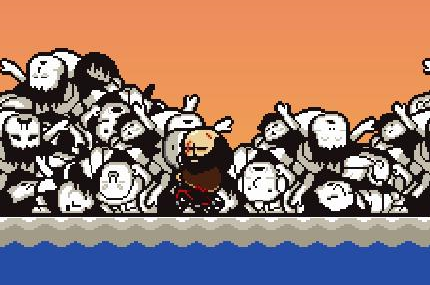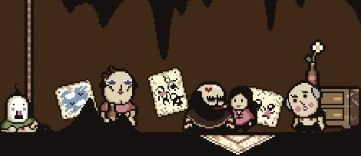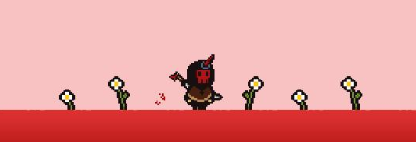Lisa: the Painful & the Joyful
I’ve got the joy, joy, joy, joy, down in my heart… (Where?)

Lisa is one of the darkest, most surreal games I have ever played. While it immediately evokes the vibe of it’s inspiration, Earthbound, Lisa is cut from a much grimmer cloth. The game embraces all the Post-Apocalyptic tropes I hate–rampant misogyny, power structures based on brute strength, constant threat of rape and murder, endless founts of manpain, woman as trophy. The battle system is usually either monotonous or frustrating. But the graphic style and excellent soundtrack, combined with some very good staging, evoke a surprising amount of emotion and made the game compelling.
The original title in the series, Lisa: the First, is a freeware RPGMaker title. A hearty dose of Kickstarter funds led to the main game, Lisa: the Painful, and Dingaling later released an epilogue DLC, Lisa: the Joyful. I consider the DLC indispensable. I don’t think the main game should be sold without it.

Lisa: the Painful
In Lisa: the Painful the player follows Brad, a man who finds an infant girl in the wilderness and raises her as his own. She is the only woman in a post-apocalyptic wasteland and it is only a matter of time before her existence is discovered. Lisa’s big strength is it’s twists on genre conventions.* Staying in camps involves random encounters. Party members can be kidnapped, Brad can be bitten by insects, items get stolen, and certainly not least, a wandering bandit may fart on your head.
- Perma-death is possible for companions, which is why it’s fortunate there are 30. They can lose at Roulette, be killed by kidnappers, and be sacrificed for a body part. Additionally, some enemies have perma-death attacks that will wipe out a team member with a single blow.
- Addiction is addressed and has consequences. Brad goes through withdrawal that severely limits his combat ability. Taking another hit of Joy boosts his stats, but withdrawal returns with a vengeance. The ending is also affected by whether Brad has taken Joy.
- Every NPC has a unique design and personality
Lisa’s big selling point is choice. Jorgenson specifically cites obvious choices (where the “good” option is clear) and meaningless choices as a genre problem he wanted to confront. Brad has several tough choices to make, many involving the death of party members or otherwise handicapping Brad to make the game more difficult, but over time the player’s control over even this wanes. Eventually the player is reduced to voyeur, powerless to do anything but push Brad forward. This is by design. As Brad loses control, so does the player.
Unfortunately, the net result is that in the end, none of the player’s choices really seem to matter. The world of Olathe chisels survivors into monsters, it is a misogynistic horrorscape with no narrative purpose beyond putting the characters through their paces and eventually destroying them.
Unsurprisingly, the game was billed as anti-feminist and caused a bit of a stir on release. Jorgensen says he never intended for Lisa to have a message and I believe him. It’s an interesting yarn, compelling because of its twists on convention and darkly comedic (and weirdly effective) tone. It is surprisingly emotional and heartfelt in many respects, but Lisa never challenges the player philosophically or confronts these problems.
Characters routinely refer to women as bitches, confessing they miss their wives or girlfriends while maligning them in the same breath. The vast majority of the populace is more interested in gang-raping a young girl than the preservation of the species. In fact, removing Buddy’s mask in Joyful is a hard-mode mechanism, when it is apparent she is female almost every character in the game will attack her on sight, including vendors. The game never discusses or questions this beyond acknowledging this is how the world works and Buddy has to deal with it. I hesitate to even call the game a parody, because parody implies an exaggeration to make a point, and I don’t know that Lisa actually does this. It wallows in the very tropes it amplifies.
The game is not difficult, even if Brad makes bodily sacrifices. With the right party (Olan, Birdie Hall, and Ajeet were my dream team) and good use of status ailments and items, the base game is a breeze compared to the DLC.

Lisa: the Joyful
In Lisa: the Joyful the player follows Buddy, the last girl. Buddy is determined to preserve her freedom and bodily autonomy at any cost and goes on a killing spree through Olathe.
The difficulty is ramped up. The party is reduced (often Buddy is alone) and there are few weapons and no armor. Supplies are scarce, as are campsites, which are limited to one use after each boss battle. Additionally, a timed-attack mechanic is introduced without explanation. Buddy’s basic attack, around 200 damage, barely puts a dent in the high-HP mutants and bosses that litter the eastern side of Olathe. A properly timed Throat Lunge causes from 1,500 to 6,000 damage plus a chance for bleeding, leveling the playing field considerably, but it took me a while to master the timing (I actually ended up replaying the first part twice).
As in the Painful, status ailments are Buddy’s salvation. The Flash ability, which temporarily flusters enemies and prevents them from attacking, is an absolute necessity. Sleeping bombs help reign in multiple enemies. The passive damage from poison and bleeding are a Godsend. If you survive long enough to reach level 19 and the Mend skill, which cures 700-1000 HP, the game’s difficulty scales down dramatically.
I really enjoyed this game. I laughed quite a bit and I teared up at the end. However, I can’t recommend it because it’s a trigger-warning nightmare. I went into it knowing the basic premise, but I didn’t anticipate half the shit this thing threw at me. I think the overall tone does a good job of offsetting a lot of truly disturbing subject matter with just enough WTF weird/dark humor to keep things moving along, but it’s definitely not for everyone. If you’re interested in quirky RPGs that play with the genre and choice, I would recommend Undertale unequivocally (I prefer the way Undertale handles choice, too). If you’re interested in Lisa try the demo first.
When I was really into the game, mid-Joyful, I thought I’d go back and get the handful of achievements I missed and even considered replaying the Painful on hard mode. After I beat Joyful I went to the wiki to get more background information the characters. I was put off by how angsty and ham-handed the Lisa/Buzzo storyline actually was, most of it seemed engineered for pure shock value and was honestly pretty eye-roll worthy. The artless handling turned me off of playing Lisa: the First entirely. Lisa works best when its mysteries are only hinted at, I’m content to leave it that way.
I’ve got the joy, joy, joy, joy,
Down in my heart,
Down in my heart to stay…